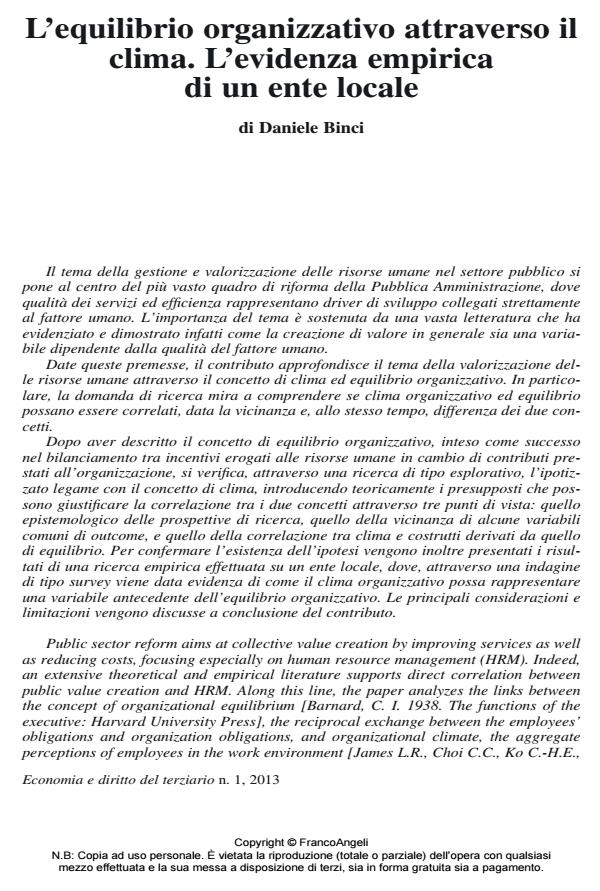L’equilibrio organizzativo attraverso il clima. L’evidenza empirica di un ente locale
Titolo Rivista ECONOMIA E DIRITTO DEL TERZIARIO
Autori/Curatori Daniele Binci
Anno di pubblicazione 2013 Fascicolo 2013/1
Lingua Italiano Numero pagine 33 P. 65-97 Dimensione file 421 KB
DOI 10.3280/ED2013-001004
Il DOI è il codice a barre della proprietà intellettuale: per saperne di più
clicca qui
Qui sotto puoi vedere in anteprima la prima pagina di questo articolo.
Se questo articolo ti interessa, lo puoi acquistare (e scaricare in formato pdf) seguendo le facili indicazioni per acquistare il download credit. Acquista Download Credits per scaricare questo Articolo in formato PDF

FrancoAngeli è membro della Publishers International Linking Association, Inc (PILA)associazione indipendente e non profit per facilitare (attraverso i servizi tecnologici implementati da CrossRef.org) l’accesso degli studiosi ai contenuti digitali nelle pubblicazioni professionali e scientifiche
Il tema della gestione e valorizzazione delle risorse umane nel settore pubblico si pone al centro del più vasto quadro di riforma della Pubblica Amministrazione, dove qualità dei servizi ed efficienza rappresentano driver di sviluppo collegati strettamente al fattore umano. L’importanza del tema è sostenuta da una vasta letteratura che ha evidenziato e dimostrato infatti come la creazione di valore in generale sia una variabile dipendente dalla qualità del fattore umano. Date queste premesse, il contributo approfondisce il tema della valorizzazione delle risorse umane attraverso il concetto di clima ed equilibrio organizzativo. In particolare, la domanda di ricerca mira a comprendere se clima organizzativo ed equilibrio possano essere correlati, data la vicinanza e, allo stesso tempo, differenza dei due concetti. Dopo aver descritto il concetto di equilibrio organizzativo, inteso come successo nel bilanciamento tra incentivi erogati alle risorse umane in cambio di contributi prestati all’organizzazione, si verifica, attraverso una ricerca di tipo esplorativo, l’ipotizzato legame con il concetto di clima, introducendo teoricamente i presupposti che possono giustificare la correlazione tra i due concetti attraverso tre punti di vista: quello epistemologico delle prospettive di ricerca, quello della vicinanza di alcune variabili comuni di outcome, e quello della correlazione tra clima e costrutti derivati da quello di equilibrio. Per confermare l’esistenza dell’ipotesi vengono inoltre presentati i risultati di una ricerca empirica effettuata su un ente locale, dove, attraverso una indagine di tipo survey viene data evidenza di come il clima organizzativo possa rappresentare una variabile antecedente dell’equilibrio organizzativo. Le principali considerazioni e limitazioni vengono discusse a conclusione del contributo.
Daniele Binci, L’equilibrio organizzativo attraverso il clima. L’evidenza empirica di un ente locale in "ECONOMIA E DIRITTO DEL TERZIARIO " 1/2013, pp 65-97, DOI: 10.3280/ED2013-001004